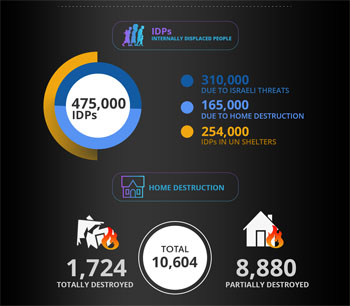Jerusalem, April 20, 2009 -- The World Bank published a report today entitled Assessment of Restrictions on Palestinian Water Sector Development. The report is the Bank’s first on the issue of water in the West Bank and Gaza (WBG). Together with two other recent reports, examining access to West Bank land and to telecommunication frequencies, it provides comprehensive insight into a critical, but largely unaddressed component of the economic restrictions impeding Palestinian economic development -- limited access to natural resources.
Noting the complete dependence of WBG on scarce water resources shared and largely controlled by Israel, the report finds that the joint governance rules and water allocations established under the 1995 Oslo interim agreement, still in effect today, fall short of the needs of the Palestinian people. Because of the imbalance in power, capacity and information between parties, interim governance rules and practices have resulted in systematic and severe constraints on Palestinian development of water resources, water uses, and wastewater management. Furthermore, since 2000, the Israeli-imposed movement and access restrictions, consisting of physical impediments, but also of permitting and decision-making practices, have further impaired Palestinian access to water resources, infrastructure development and utility operations.
When combined with governance and capacity weaknesses in Palestinian institutions, these rules and restrictions have resulted in an underdeveloped Palestinian water sector. Even though the PA and many donors have invested in establishing a sustainable and equitable water sector, access to water resources, water infrastructure and institutions remain inadequate. The sector continues to operate in a very inefficient emergency mode, with far reaching economic, social and environmental consequences. Water-related humanitarian crises are in fact chronic in Gaza and in parts of the West Bank.
Indeed, availability of water resources is highly disparate, with fresh water per capita in Israel approximately four times that of WBG. Whereas Israel has established efficient water infrastructure and management, the PA is struggling to attain the basic level of infrastructure and service of a low-income country. Water investment in WBG has dropped to very low levels, is fragmented and inefficient, and perpetuates low utility performance. In Gaza, marginal water and sanitation investment is contributing to an unchecked water quality crisis with severe public health and environmental impacts.
To begin ameliorating the situation, , the study recommends the adoption of an agenda that clearly addresses identified shortcomings in water resource development and management, a low and declining investment rate, and weak management of water services. This would require formulation of effective solutions to the following existing problems:
- A joint governance system asymmetrical in power and capacity, which does not facilitate the rational planning and development of Palestinian water resources and infrastructure;
- An investment environment that creates huge costs and delays;
- Implementation restrictions that can make the movement of a single pipe a logistical and administrative challenge;
- Weak institutional capacity of the PA and of most sector actors (such as operators and municipalities) for planning, implementation and management of water infrastructure;
- Development partnerships that move uneasily between the political context and the development challenge and are often stuck in emergency rather than strategic mode.
__________________________________________________________
About the Report
The report was initiated at the request of the PA. Its goal is to develop a balanced analysis and to create awareness of the factors restricting West Bank and Gaza’s water sector development as well as of the economic, socio-political, and environmental impacts of such restrictions. It was conducted during Sept. 2008 and Feb. 2009, by a multi- disciplinary team of international and local experts on water resource management, water supply and sanitation, sociology, public policy and conflict, and involved consultations on process and findings with Palestinian and Israeli stakeholders. The target audience includes Palestinian and Israeli government officials, as well as the donor community and all stakeholders engaged in the water sector, including Palestinian water providers and users. The findings are also expected to be of immediate interest to the donors’ Ad Hoc Liaison Committee when it convenes this spring.
To View the Full Report as PDF (3.2 MB)





